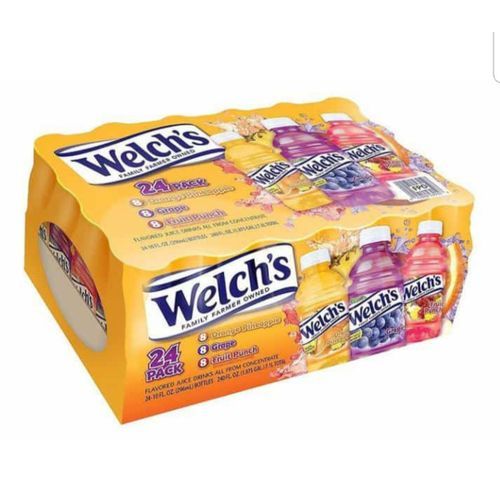Currently Empty: ₦0.00
Welch’s Orange Pineapple/ Grape/ Fruit Punch Juice – PACK OF 24
The method of pasteurizing grape juice to halt the fermentation has been attributed to a British–American physician and dentist, Thomas Bramwell Welch (1825–1903) in 1869. Welch was an adherent to the Wesleyan Methodist Connexion which strongly opposed “manufacturing, buying, selling, or using intoxicating liquors” and advocated the use of unfermented grape juice instead of wine for administering the sacrament of the Eucharist, or communion, during the church service. A few years earlier, Welch had relocated to Vineland, New Jersey, a town started in 1861 by Philadelphia land developer Charles K. Landis (1833–1900) to create his own alcohol-free utopian society, a “Temperance Town” based on agriculture and progressive thinking. Landis declared that he was “about to build a city, and an agricultural and fruit-growing colony around it.” The population reached 5,500 by 1865. Landis determined the potential in growing grapes and named the settlement “Vineland”, and advertised to attract Italian grape growers to Vineland, offering 20 acres (81,000 m2) of land that had to be cleared and used to grow grapes. Welch had moved to the region following his sister who was one of Vineland’s earliest residents and began to produce an “unfermented wine” (grape juice) from locally grown grapes that was marketed as “Dr. Welch’s Unfermented Wine”. This product became “Welch’s Grape Juice” in 1893 when Welch and his son Charles E. Welch (also a practicing dentist) had decided to incorporate in 1893 as the Welch’s Grape Juice Company at Westfield, New York. The product was given to visitors at international exhibitions. The oldest extant structure associated with the company is Welch Factory Building No. 1, located at Westfield, and listed on the National Register of Historic Places in 1983.
As the temperance movement grew, so did the popularity of grape juice. In 1913, Secretary of State William Jennings Bryan served grape juice instead of wine during a full-dress diplomatic function, and in 1914, Josephus Daniels, Secretary of the Navy, forbade any alcoholic drinks on board of naval ships, actively replacing them with grape juice. During World War I, the company supplied “grapelade”, a type of grape jam, to the military and advertised aggressively. Subsequent development of new grape products and sponsorship of radio and television programs made the company very successful. An advertisement in a journal from the year 1914 states:
Welch’s Grape Juice has attained its popular and professional favor through merit alone. This product has been perfected and marketed under the personal direction of the physician whose name it bears and whose purpose from the beginning was to produce a liquid food possessing all the nutrient essentials necessary to metabolism in sickness and convalescence.
Showing the single result

